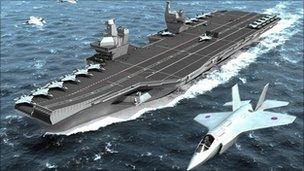Defence buying needs greater scrutiny, say MPs
- Published

The Treasury said cancelling the aircraft carriers would have cost £5.5bn
Defence contracts must be better scrutinised to prevent "serious blunders" in government purchasing, a cross-party committee of MPs has said.
The Treasury Select Committee urged the coalition to improve "interaction" between departments over procurement.
It added that ministers should learn lessons from Labour's contract for two aircraft carriers, which would have cost more to cancel than implement.
Ministers said they were addressing the issues raised by the MPs.
They also queried ring-fencing health and international development budgets.
In a report looking at last month's Spending Review, the committee noted that the Ministry of Defence (MoD) had a "poor record" on dealing with major contracts.
'Over-committed'
It urged the Treasury to learn lessons from the contract for two aircraft carriers struck by the MoD under the previous Labour administration, which made it more expensive to cancel the project than to build the £5.2bn ships.
Prime Minister David Cameron announced last month that he was pressing ahead with building both carriers, even though one would then be held in "extended readiness", rather than be at sea.
The Treasury released a letter from manufacturer BAE Systems, showing that cancelling one of the ships would have taken the cost to £5.5bn and meant the closure of three shipyards with the loss of more than 5,000 jobs.
The select committee's report noted that the coalition had inherited an "over-committed" defence budget from Labour.
It added: "Successive governments have tried and failed to deal with over-commitments.
'Poor record'
"The major concern of the committee is the interaction between the Treasury and the Ministry of Defence over how defence acquisitions, and day-to-day funding, is agreed.
"In many cases, it may be sensible to accept that the high costs of short-term contracts are offset by the increased flexibility they give. There will however be some long-term projects which cannot be planned within the confines of the Spending Review, as these are in the programmes of many spending departments.
"The MoD has a poor record of dealing with such contracts. These continuing difficulties suggest that the level of scrutiny given to these contracts by the central departments is not sufficient to prevent serious blunders in procurement."
On the aircraft carriers, the committee added: "The Treasury should draw on the lessons from the contract to analyse all future Ministry of Defence procurement to ensure that value for money is being obtained, particularly when little competition exists in the market."
The report also raised questions over the government's decision to "ring-fence" spending on the NHS and international development, fulfilling a election promise made by the Conservatives.
This could cause "allocative problems", with other departments facing deeper cuts, the committee said.
Peter Luff, minister for defence equipment, said he welcomed the committee's "understanding of the severe pressures the MoD budget has been under as a result both of the overcommitment by the last government and contractual obligations it entered into".
He added: "The new ministerial team is determined to address these and other issues in the acquisition process.
"Following the Strategic Defence and Security Review, the MOD is now engaging in an extensive programme of commercial negotiations and contract terminations with industry.
"In addition to the ongoing work on acquisition reform, the Defence Reform Unit will examine the wider acquisition process to ensure the department can deliver the equipment our Armed Forces need on time and on budget."
- Published19 October 2010
- Published29 October 2010